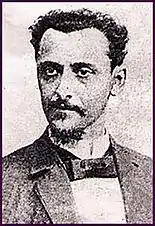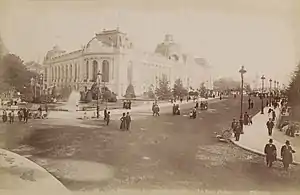Henri Deglane (architect)
Henri Adolphe Auguste Deglane (10 December 1855, Paris - 13 May 1931, Marquay) was a French architect.


(Winston-Churchill) going right
Biography
He was a student of Louis-Jules André at the École des Beaux-Arts in Paris. His first exhibit was in 1880, at the Salon des Artistes Français, where he was awarded a third-class medal. The following year, his designs for a "fine arts palace" earned him the Prix de Rome. He was a resident at the Académie de France à Rome from 1882 to 1885.[1]
Upon returning to France he continued to exhibit at the Salon, obtaining a second-class medal in 1887, and a medal of honor in 1888.[2] He achieved a gold medal at the Exposition Universelle in 1889. After 1890, he served as head of the architecture studio at the École.
For the Exposition Universelle of 1900, he participated in the design and construction of the Grand Palais (1896-1900). He was in charge of the nave and façade, overlooking what is now the Avenue Winston-Churchill.[3] Over the next two decades, he created numerous homes and shops, as well as monuments to Lazare Carnot, Joseph François Dupleix, William Shakespeare, Joan of Arc, and Guy de Maupassant.
His work on the Grand Palais earned him a place as an officer in the Legion of Honor.[1] In 1918, he was elected a member of the Académie des Beaux-Arts, taking Seat #1 for architecture, which he held until his death.[1]
He was able to purchase the Château de Laussel, a sixteenth-century castle near Marquay, and spent his later years restoring it.
References
- « Deglane, Henri », AGORHA, plateforme de données de la recherche de l’Institut national d'histoire de l'art.
- René Édouard-Joseph, Dictionnaire biographique des artistes contemporains, tome 1, A-E, Art & Édition, 1930, p. 370
- « Les palais des Champs-Élysées », Le Radical, 3 mai 1900, @ RetroNews.
External links
![]() Media related to Henri Deglane at Wikimedia Commons
Media related to Henri Deglane at Wikimedia Commons